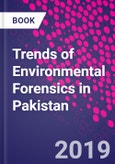Trends of Environmental Forensics in Pakistan covers a variety of topics, including discussions on alterations in soil chemistry that are related to the malicious effects of pesticides, variations in biosphere and hydrosphere due to deviating toxicological responses, evidence and datasets to highlight potential crimes, and the advent of biological warfare and its effects across the globe, and exclusively in Pakistan. Pakistan, a country comprised of vast climatic zones, ethnic groups, diverse faiths and profound biodiversity is also vulnerable to different devastating incidents, hence this book presents tactics and information that are critical to this region.
Please Note: This is an On Demand product, delivery may take up to 11 working days after payment has been received.
Table of Contents
1. Environmental Toxicology: Fundamental and Forensic 2. Forensic Archaeology 3. Pedospheric Environmental Forensic Aspects 4. Forensic Evaluation of Child Abuse 5. Forensic Materials Analysis and Engineering 6. Forensic Laboratory Practices and Quality 7. Bioterrorism: An Emerging Threat
Authors
Shazia Iftikhar Associate Professor, Department of Environmental Sciences, Fatima Jinnah Women University, Punjab, Pakistan. Dr. Shazia Iftikhar obtained her M.Sc. in Plant Sciences from the Bahauddin Zakaryia University, Multan, Pakistan (thesis title "Effect of salinity on growth and germination of some cultivars of sesame (Sesamum indicum L.). She obtained her M. Phil degree from the Biological Sciences Department, Quaid-i-Azam University, Islamabad, Pakistan (thesis title "Screening of rice (Oryza sativa L.) germplasm for salt tolerance�). During her PhD studies, Dr. Iftikhar gained a DAAD fellowship from Germany, a sandwich programme between Quaid-i-Azam University and Kaiserslautern University, Germany. The title of her Ph.D. thesis was "Pathobiology and host-parasite genetics of root rot and foliar blight in rice-wheat cropping systems�. She was awarded an Alexander von Humboldt fellowship for postdocs at the University of Karlsruhe and the University of Kaiserslautern, Germany.After her Ph.D., she was appointed to Punjab University, Lahore, as Assistant Professor, Department of Pathology and Mycology. After a few years at Punjab University, she moved to Fatima Jinnah Women's University as Assistant Professor in the Department of Environmental Sciences where she established the laboratory of Environmental Mycology and Eco-toxicology. Dr Iftikhar has broad experience in the development and leadership of scientific projects at national and international levels. She was awarded the Best Teacher award of 2008 from the Higher Education Commission, Pakistan based on teaching evaluations, theses and publications in national and international journals.








